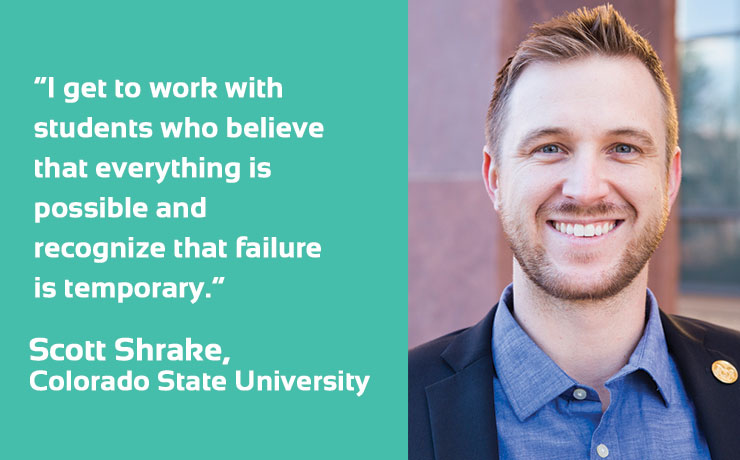
We continue our series highlighting educators within the VentureWell network who are doing good work—faculty members who are catalyzing change in higher education and inspiring students to impact the world through invention. This month’s faculty spotlight is Scott Shrake, Director at the Institute for Entrepreneurship, Colorado State University College of Business. Shrake is an active member of the VentureWell community, serving as a Principal Investigator for a Faculty Grant and an E-Team.
How did you get interested in teaching entrepreneurship?
For me, entrepreneurship was one of the first lenses that helped me grasp engineering education. Nearly all of the classes I took during my undergraduate and graduate engineering education were all theoretical and had (seemingly) little real world application. It wasn’t until I came across entrepreneurship and environmental sustainability that I truly understood the power of engineering to transform society. After that realization, I dove into teaching entrepreneurship because I found it to be one of the strongest vehicles to teach a wide variety of hard and soft skills to students from every discipline. It’s also an incredible tool for enabling students that are passionate about social impact.
What is your favorite thing about teaching?
Impact and optimism. Students believe that everything is possible and recognize that failure is temporary. Every day I get to interact with people who believe they have the power to change the world for the better. We need more people with that optimistic worldview in order to address the challenges that we face collectively as a society.
Where would you like to see the field of entrepreneurship in five years?
I think the innovation in entrepreneurship education lies in increasing accessibility. I’d like to continue to see entrepreneurship education make its way through all grade levels, and continue to support local communities. Entrepreneurship and education are two incredible tools for leveling playing fields, and one of the strongest ways to enable the success of people from every background.
What traits make for great teachers, advisors, and mentors?
Personally, I believe that humility, compassion, and experience create a strong foundation for being a good mentor or educator. One of the most powerful things a mentor can do is empathize with the team as they push through challenges and genuinely believe in the students—not necessarily their venture.
What books on entrepreneurship and innovation have you been reading lately?
Measure What Matters by John Doerr encourages early- and mid-stage companies to keep their eyes on the prize and ensure their product aligns with their long-term goals. One of the biggest challenges I see with student teams is the inability to sort through priorities. They spend a disproportionate amount of time and resources on work that doesn’t bring them long-term value.
What’s your most useful classroom activity or assignment?
We do a derivative of an activity that I co-developed with my colleague Brent Sebold at Arizona State University that I’ve termed “The Ram Rumble.” It’s an immersive, fast-paced experience with minimal supervision that has students take a concept from idea to product in a very short period of time. We go through the basics of problem identification, pain point validation, customer discovery, human centered design, prototype development, user feedback, prototype iteration, and a final pitch all in a time frame of 3 – 8 hours. It enables the students to recognize how all of those concepts are essential to create a valuable product, so they have context as we dive deeper into each concept throughout the program. The Ram Rumble also shows students that prototypes don’t have to be perfect, time isn’t always on your side, and getting out of the classroom is invaluable.